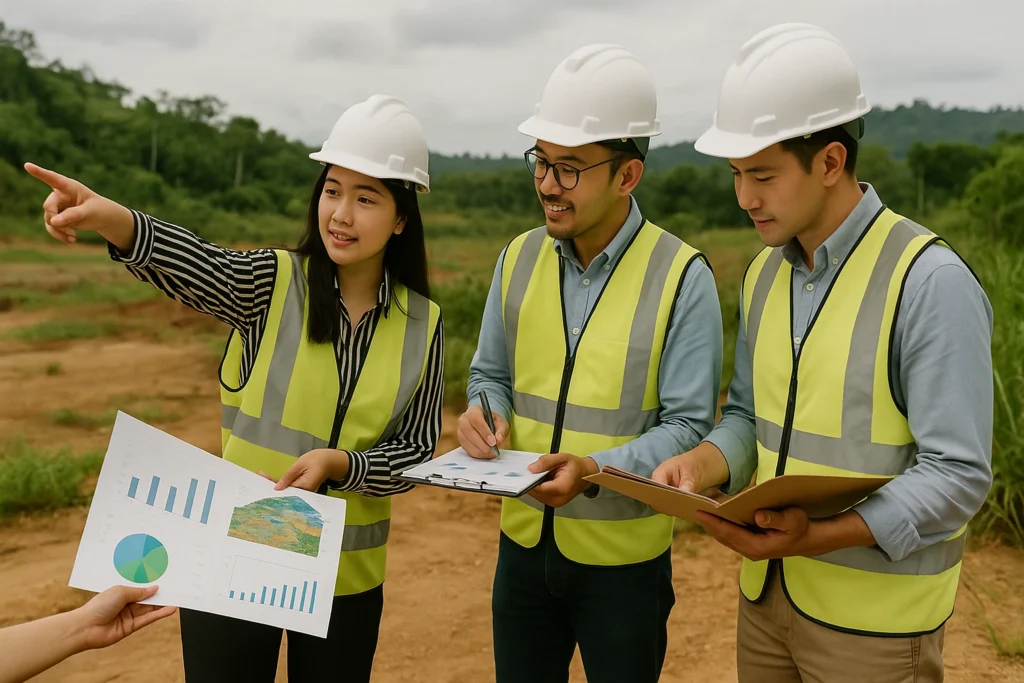Environmental Permit (AMDAL, RPL-PKL)

Overview
To comply with Indonesian environmental regulations and secure necessary risk-based business licenses, companies can utilize application services for their Environmental Impact Assessment (AMDAL) and Environmental Management Plan and Environmental Monitoring Plan (RPL-PKL). Business Hub Asia provides comprehensive support, including environmental permit application services and the development of environmental management and monitoring plans, to streamline these crucial processes for business operations.
Key Features
Environmental Impact Analysis (AMDAL)
AMDAL document preparation includes KA-ANDAL, ANDAL, RKL, and RPL for businesses with significant environmental impacts.
Preparation of Environmental Management & Monitoring Plan (RPL-PKL)
For businesses that are not required to have an AMDAL but still need an environmental management and monitoring plan.
Environmental Approval Process Assistance
Coordination of submissions to the OSS-RBA system and authorized agencies, including assessment by the KLHK Test Team or the Environmental Agency.
Consultation on Business Category Determination
Identify the type and scale of the business to determine whether an AMDAL is required or whether an RPL-PKL is sufficient.
Final Document Ready to Use for Business License Processing
The approved environmental permit is a prerequisite for obtaining the main license and commencing business operations.
Minimum Requirements
Company Legal Documents
Complete company legality (NIB, Deed, NPWP)
Business Activity Info
Complete information on business activities (location, area, process, output)
Technical Plan
Technical plan and facility layout
Environmental Impact
Identification of potential environmental impacts
Supporting Documents
Other supporting documents, according to the type of activity
Common Sectors that need an Environmental Licence
Manufacturing and heavy processing industry
Energy and power generation
Infrastructure and construction
Mining and natural resource exploration
Industrial estates and large-scale property
Transportation and ports
Process and Timeline
1
Initial Study & Screening
Determine whether a business plan or activity is required to have an AMDAL, UKL-UPL, or SPPL based on a list of activities determined by the government. Estimated Time: 1-2 working days.
2
Preparation of Terms of Reference for Environmental Impact Analysis (KA-ANDAL)
Prepare a KA-ANDAL document that includes the scope of study, methodology, and data collection plan. Estimated Time: 10-15 working days.
3
KA-ANDAL Assessment and Approval
Submission of KA-ANDAL to the AMDAL Assessment Commission to be assessed and approved as the basis for preparing ANDAL, RKL, and RPL. Estimated Time: 30 working days (excluding correction time by the proponent/consultant)
4
Preparation of ANDAL, RKL, and RPL Documents
Prepare the Environmental Impact Assessment (ANDAL), Environmental Management Plan (RKL), and Environmental Monitoring Plan (RPL) documents based on the approved KA-ANDAL. Estimated Time: 20-30 working days.
5
Assessment and Approval of ANDAL, RKL, and RPL Documents
Submission of ANDAL, RKL, and RPL documents to the AMDAL Assessment Commission through OSS for assessment and approval. Estimated Time: 75 working days (excluding correction time by the proponent/consultant)
6
Issuance of Environmental Approval
After the documents are declared feasible, the authorized agency (Minister, Governor, or Regent/Mayor) issues an Environmental Approval as the basis for obtaining a business or activity license. Estimated Time: 7-10 working days
*Assuming all processes run smoothly and without obstacles, the total estimated time required to complete the AMDAL, RKL-RPL, and Environmental Permitting submission process is 4-6 months.
Important Consideration
- The process can be faster if Pertek KLHK is available.
- Processing of B3 Waste without a permit may be subject to administrative or criminal sanctions.
- Permits must be renewed periodically according to the validity period.
- The application system is integrated with OSS-RBA.
Frequently Asked Questions
What are AMDAL and RPL-PKL?
AMDAL is an environmental impact study for large-scale activities, while RPL-PKL is an environmental management and monitoring plan for activities that are not subject to AMDAL.
When is my business required to have an AMDAL?
If your business activity is classified as having a large and important impact according to regulations, such as large industries, mines, or large infrastructure projects.
What is the function of environmental approval (Persetujuan Lingkungan) through OSS?
Environmental approval, stemming from the assessment of AMDAL or RPL-PKL documents submitted via OSS, is a mandatory requirement for securing a business license.
Does this environmental document apply nationally?
Yes, it applies nationally and is attached to the business license as long as there is no change in the scale or location of the activity.
Who assesses and certifies my AMDAL?
The assessment is carried out by the Test Team, which is formed by KLHK or the Environmental Agency, depending on the authority of the location.
Can I manage RPL-PKL without the help of a consultant?
Theoretically, you can, but it is advisable to use an experienced consultant to ensure that the document complies with the rules and is handled following the rules and assessment standards.
Can the Environmental Permit (Persetujuan Lingkungan) that has been obtained be used to apply for a B3 waste permit license?
To apply for a hazardous waste (B3) treatment license, an Environmental Permit is a fundamental prerequisite. Nevertheless, KLHK mandates additional technical requirements that the applicant must satisfy. These include the development of technical documents and the acquisition of technical approvals.
What is KA-Andal?
The Terms of Reference for Environmental Impact Analysis (KA-ANDAL) is the initial stage in AMDAL document preparation. It functions as a guide for identifying, planning, and structuring the execution of a comprehensive environmental impact analysis. This stage involves defining the scope and methodology for the subsequent analysis. The KA-ANDAL aims to identify potential environmental impacts early, allowing developers to plan mitigation. It also facilitates community and government input for transparency and public participation before project commencement.
Secure the Right Licenses for Your Operations
Ensure compliance with Indonesian regulations by obtaining the necessary business permits and sector-specific licenses.